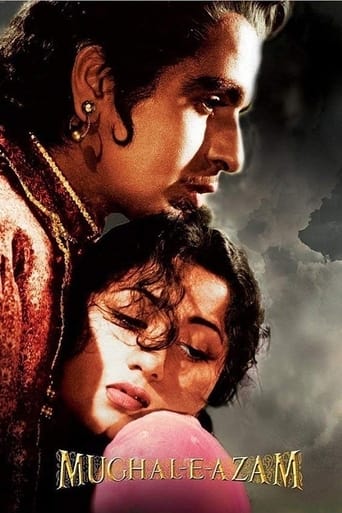runamokprods
Sort of Indian cinema's 'Gone With the Wind' in its scale and impact, this huge 3 hour epic started slowly for me, feeling awkward, dated, and a little stagy.But then, I found myself unexpectedly swept up in this story of a prince defying his father for love of a woman, really enjoying it, and wanting to see how the story would turn out.Some amazing set design, and some beautiful songs, along with often really strong cinematography.2 versions of film exist. It was originally released in 1960, mostly in black and, but with two reels in color. Filmmaker Asif had wanted to make the whole film in color, but lacked the funds. In 2004 it was re-released in a version that colorized the black and white reels. While that would normally be a film sacrilege to me, in this case it was done with loving care, at great expense, and with the intention of finishing Asif's version the way he wanted. I actually own both versions.Following the advice of what seemed the majority of critics I watched the colorized version first, and was shocked to find it really worked for me. Maybe the early Indian color process had a slightly unreal look that let the reels that were originally in color blend just about seamlessly with the colorized reels, but in any case the whole worked wonderfully.On the other hand I recently watched the film again, this time in the original mostly black and white/2 reels in color version. I found that somewhat less satisfying. The magic of the piece seemed dimmed, the fairy tale sense of being in another world less constantly palpable. The sets felt less amazing, and details didn't catch my eye the same way.The Eros release is pretty high quality for the color and the Shameroo/Eros is OK for the older black and white/color combination. That print is very beat up, but at least the image seems sharp. (As with many Indian films there are lots of weak knock off releases that look like someone just burned a VHS tape onto DVD).
Sagar Bhatt
I loved this movie; though I can't say that every part of it was perfect, it was very close to perfection. I loved the music, the dances, the culture, and the depiction of India during the Mughal empire. I especially loved the purity of the language, though I couldn't understand every word because a significant portion of it was in Urdu whereas I'm Hindu.That said, this is certainly not THE best Bollywood movie ever. Many people seem to think that, and many articles call it the #1 Bollywood movie, but there've been many other movies that I felt were better. Aamir Khan's movies, for example, are more appealing to the newer generation, and have much more to teach.
iftikharkhokher
A very finely made epic with a all-star cast,great screenplay,music,songs and direction.Some of the dialogue is immortal.I have heard it said that Dilip Kumar was outstanding but i find his performance dull and uninteresting.The stars are Madhubala and Prithviraj.If ever i wanted someone to play Akbar it would be Prithviraj.Madhubala was in her prime in this movie.The scene where she tears off her jewelery after drugging Dilip is so good and so well filmed that it becomes the whole love story itself.The dialogue is beautiful.Ajit,Murad and Durga Khotay also excel themselves.The oddity is the pale-faced Dilip.It happens that expect in Tarana,he always seems subdued whenever he is paired with Madhubala.Mughal-e-Azam is a classic but historically it is based on a myth and has no resemblance to the truth about Akbar and Jahangir.
Herag Halli
K. Asif was the Indian "Cecille B. Demille" (who was known as CB, in the industry)conceived and executed his vision on a grand Scale. There will only be one "Ben-Hur", one "Lawrence of Arabia", one "Sound of Music", one "Sangam", one "Gadar-Ek Prem Katha" and only one "Mughal-E-Azam". The grand scale is evident in the lyrical poetry set into music by music maestro Naushad, which laid the rich tapestry for this Magnum Opus. Prithviraj Kapoor, was the doyen, who started Prithvi theaters and was the patriarc of the Kapoor Clan, which included The older Raj Kapoor, Shammi Kapoor, and Sashi Kapoor. The most talented was Raj kapoor, who was the "Barnum" of the Indian Cinema. He made countless movies and everyone of them a masterpiece, but the best was "Sangam" (1963). Baritone voiced Prithviraj Kapoor, was in the same genre as Charlston Heston,Laurence Olivier and Richard Burton, an actor's actor; a style that was unique and patented. After I watched the movie after three decades, few things stood out-the ornate settings for the Madhubala's (Born as Mumtaz Begum, was married to singer/actor Kishore Kumar, and died at age of 36, from a congenital heart problem), dance sequence, the rich music, the beauty of the yesteryear actresses and the devotion of the directors to make a statement-not just a movie. For current tastes and standards("Dabaang" "Three Idiots" "Housefull 2" produced by the Bollywood suvvar scum maggots,) the movie is a drag, but for the masses in the bygone years that starved for class and elegance, this was a treat. I was not too impressed with Dilip Kumar, as young Prince, most of the time he looked distant and lost. Suffice to say he matured to be good actor ("Ram aur Shyam") in the later years. The two that carried the mantle were Kapoor and Madhubala.


